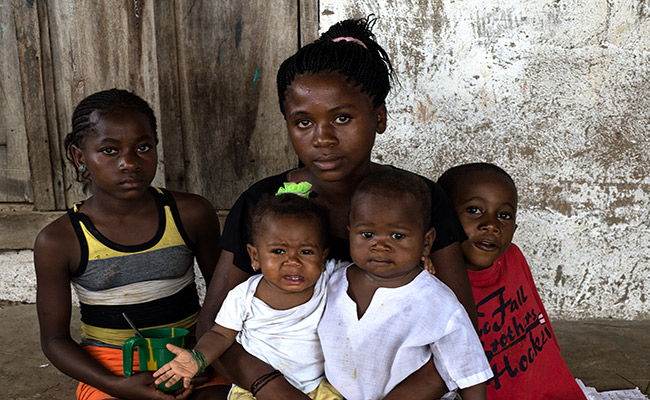
Ebola's Lost Generation

Miatta (centre) now looks after her siblings and own child after losing her parents to Ebola.
Children are being orphaned, stigmatised and discriminated against as a result of the deadly Ebola virus. At least 3,700 children in Guinea, Liberia and Sierra Leone have lost one or both parents to the disease and many of these children have nowhere to go as extended families are refusing to care for them.
“One of the main tragedies of Ebola is that many children, who have already witnessed one or both parents dying in terrible circumstances, are now being abandoned because people are so terrified of contracting the disease. The traditional safety net of community support is under threat,” says Justin Forsyth, CEO of Save the Children.
Member agencies of the Disasters Emergency Committee (DEC) are supporting orphaned children in interim care centres and providing psychosocial support to those affected.
Save the Children is supporting an Interim Care Centre in the remote district of Kailahun in Sierra Leone, one of the worst affected areas in the country. One of the young boys supported by the centre lost his father and six members of his family to Ebola.
Plan is offering psycho-social support to children who are affected by the disease. This includes a young girl who watched her mother’s body being taken away in plastic sheets.
“Witnessing the sudden death of their family members and medical personnel in masks and protective gear spraying unknown liquids is severely traumatising children,” says Anita Queirazza, Child Protection Specialist for Plan. “Many of them do not receive any form of psychological support. They are left alone at a time when they most need to be comforted.”
Member agencies are also working hard to educate people about Ebola and challenge the stigma and misunderstandings around the disease.
“Tackling the stigma and misunderstandings around Ebola is vital to ensure that vulnerable and traumatised children receive the care and support that they desperately need,” says Jane Moyo of ActionAid. “Genuine, honest dialogue with people in affected communities is crucial if stigma and prejudice are to be overcome. That includes community mobilisation and local leadership so that Ebola myths can be challenged.”

